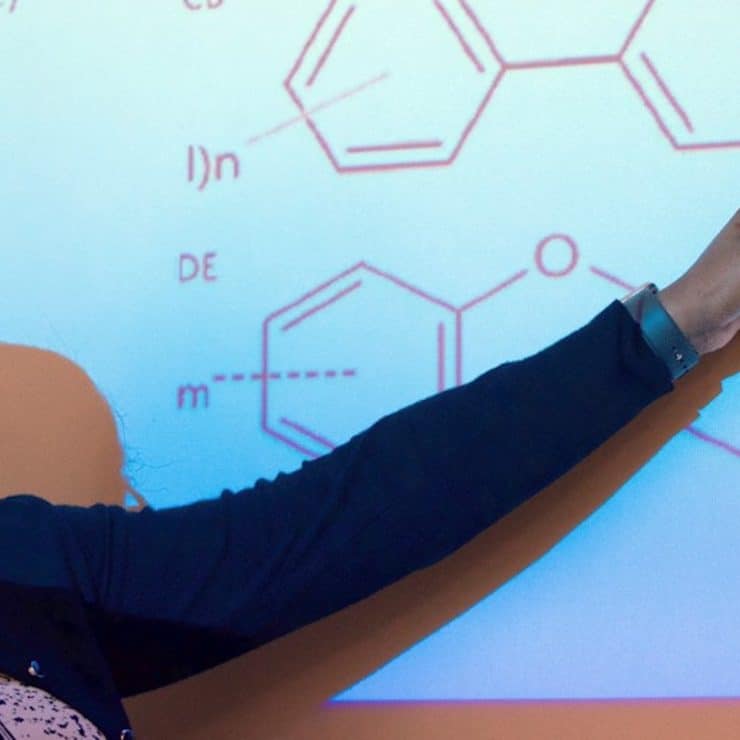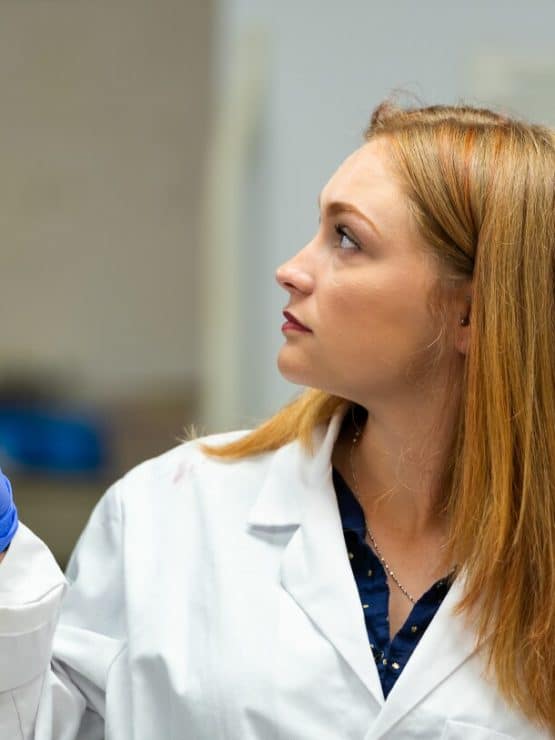
Biochemistry
The concentration in Biochemistry gives a thorough comprehension of chemical nature and interactions of biological molecules. Upon completion, students will be versed in acid-base chemistry, enzymes, coenzymes, and the interrelationships of compounds in major metabolic cycles. Additional courses include molecular and cellular physiology. Our curriculum prepares students for work in a variety of industries including cosmetics, food chemistry, biotechnology, and pharmaceuticals. Students with this concentration are well-prepared for further study in chemistry, biology, and medicinal professions such as dentistry or
pharmacy.
Common Career Paths
Some of the top jobs for those with a Biochemistry bachelor degrees include clinical research associate, biomedical scientist, biomedical engineer, toxicologist, physician associate, biochemical engineer, pharmacologist, and many more.
Common Salary Ranges for Graduates
As mentioned above, there’s a long list of career opportunities for those with Biochemistry degrees. But, the U.S. Bureau of Labor Statistics reports the average annual salary for the following positions (which may require additional education) in North Carolina in 2021:
- Bioengineers and biomedical engineers: $101,020
- Biochemists and biophysicists: $113,460
- Pharmacists: $125,690
Average Tuition Cost
The average cost for an incoming residential freshman to attend MU is less than $18,000 – similar to the cost of attending one of the big-box public schools, but with the enhanced value of a highly-regarded private school with a 12:1 student-to-faculty ratio.
While tuition varies, depending on a student’s financial aid package, it’s important to know that the average financial award for an incoming residential freshman at MU is more than $34,000.
Financial Aid & Scholarships
More than 97% of MU students receive some form of financial aid, with the University offering more than $24 million annually to students for scholarships. If a student is active military, family of active military, or a veteran, they may also qualify for MU’s military education benefits.
Interested in Methodist University’s Biochemistry concentration?
If you have questions, reach out to Dr. Stephanie Hooper Marosek at her contact info at the bottom of the page. If you’re ready to apply today, click the button below!
Frequently Asked Questions
Some of the top jobs for those with a Biochemistry bachelor degrees include clinical research associate, biomedical scientist, biomedical engineer, toxicologist, physician associate, biochemical engineer, pharmacologist, and many more.
The concentration in Biochemistry gives a thorough comprehension of chemical nature and interactions of biological molecules. Upon completion, students will be versed in acid-base chemistry, enzymes, coenzymes, and the interrelationships of compounds in major metabolic cycles. Additional courses include molecular and cellular physiology. Our curriculum prepares students for work in a variety of industries including cosmetics, food chemistry, biotechnology, and pharmaceuticals. Students with this concentration are well-prepared for further study in chemistry, biology, and medicinal professions such as dentistry or pharmacy.
Biochemistry is the study of chemistry within living things. Organic chemistry is the study of the chemistry within carbon compounds.
Major Requirements
The Chemistry major with a concentration in Biochemistry consists of 68-69 credits distributed as follows:
Required Core Courses
37-38 credits
| CHE 1510/1511 General Chemistry I with Lab (4) | CHE 3520 Instrumental Analysis (4) |
| CHE 1520/1521 General Chemistry II with Lab (4) | CHE 4210 Thermodynamics and Kinetics (4) or CHE 4220 Quantum Mechanics and Spectroscopy (4) |
| CHE 2210/2211 Organic Chemistry I with Lab (4) | CHE 4860 Library Research Project (1) or CHE 4870 Laboratory Research Project (2) |
| CHE 2220/2221 Organic Chemistry II with Lab (4) | PHY 1510 General Physics I (4) or PHY 2510 General Physics I-Calculus Based (4) |
| CHE 3510 Quantitative Analysis (4) | PHY 1520 General Physics II (4) or PHY 2520 General Physics II-Calculus Based (4) |
Required Biochemistry Concentration Courses
8 credits
| CHE 4500 Biochemistry (4) | CHE 4600 Advanced Biochemistry (4) |
Biochemistry Concentration Electives
4 credit hours
Select one course from the following list:
| CHE 2300 Basic Environmental Chemistry (4) | CHE 4100 Forensic Chemistry (4) |
| CHE 3100 Inorganic Chemistry (4) | CHE 4220 Quantum Mechanics and Spectroscopy (4) |
| CHE 4000 Medicinal Chemistry (4) |
Required Biochemistry Biology Courses
8 credits
| BIO 1530/1531 Fundamentals of Biology I with Lab (4) | BIO 2970 General Microbiology (4) or BIO 3960 Molecular Genetics (3) |
Required Mathematics Courses
11 credits
| MAT 2200 Applied Statistics (3) | MAT 2420 Calculus II (4) |
| MAT 2410 Calculus I (4) |
Contact
Stephanie Hooper Marosek, Ph.D.

